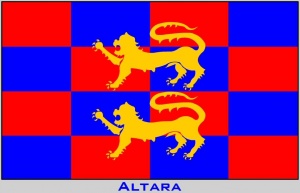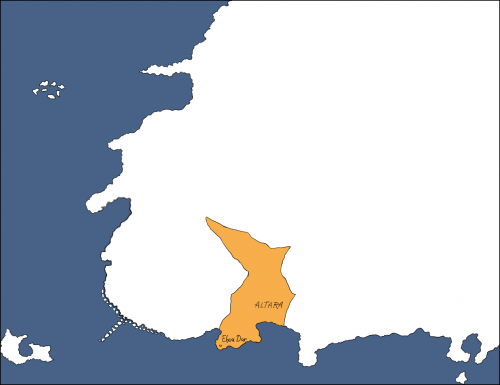Altara
| ||
| Altara | ||
| Sigil | Two golden leopards, one above the other; the Golden Leopards; the Leopards | |
| Banner | The Golden Leopards on a field checked four-by four in red and blue, with red next to the staff on the topmost row. | |
| Capital | Ebou Dar | |
| Ruler | King Beslan Quintara | |
| Throne | The Throne of Winds | |
| Crown | ||
| Palace | The Tarasin Palace | |
A similar entry appears in the Wheel of Time Companion confirming the information available in the main story arc.
Unless stated otherwise, all information herein is taken from The World of Robert Jordan's "The Wheel of Time", Chapter 30.
Author: Toral Delvar
Pronunciation: al-TAH-rah
General
The country of Altara does not have the strong central control that most of the other countries do. Like Murandy, it is in many ways a land in name only, with many inhabitants seeing themselves as primarily subjects of a particular lord or lady rather than a subject of the Queen. The nobles themselves seldom pay taxes or more than lip service to the Queen. It is perhaps only the fact that it is surrounded by strong neighbours that keeps it together as a nation, as fear of annexation is strong.
History
An entry appears in the Wheel of Time Companion for this article but no information is available in the main story arc.
Geography
Relation to Previous National Borders
According to the majority of the maps, most of the land that forms Altara was previously claimed by Shiota, though a portion of Farashelle east of Garen's Wall is now claimed by Altara. During the time of the Compact of the Ten Nations, the land that is now Altara was part of the countries of Manetheren and Eharon (TWoRJTWoT, Ch. 10; TWoRJTWoT, Ch. 15).
Borders
Altara is a land at the far south of the main continent on the Sea of Storms. It borders Illian on the east and Amadicia on the west. To the north, it shares borders with Ghealdan, Andor, and Murandy.
Geographical Features
Much of Altara is forested, a mix of evergreens and deciduous, including the land above the Eldar where Salidar lies and all the land for three days to the east of that (LoC, Ch. 31). In the south, in the hills around Ebou Dar, there are olive groves and vineyards (ACoS, Ch. 3; CoT, Ch. 10).
- Bodies of Water
- The Sea of Storms
- The Eldar
- The Manetherendrelle
- The Reshalle
- Hills and Mountains
- The Venir Mountains, along the south coast, dwindling to hills just outside Ebou Dar (TPoD, Ch. 14)
- The Rhiannon Hills.
- The Damona Mountains (KoD, Ch. 25)
- The Malvide Narrows, a five mile wide gap in the mountains and the Molvaine gap (KoD, Ch. 27)
- Miscellaneous Features
Government
Altarans and Altaran nobles show little loyalty to the nation and less to the throne. Before the Seanchan arrived, the various nobles were all but independent, with fear of each other and of Amadicia and Illian on either side being the main reason for any cohesiveness as a nation. Altara was also caught up in the battles against Logain (TDR, Ch. 13). Following Rand's battle in Falme and his taking of the Stone of Tear, Altara, as with many of the other countries, suffered from Dragonsworn. This was exacerbated by Pedron Niall and a plan he set in motion, a plan to have Dragonsworn plague the country (LoC, Prologue; ACoS, Ch. 12). With its proximity to Ghealdan, it was also affected to some extent by the Prophet and his mobs. Away from Ebou Dar, the law is what the local lord or lady says and the paying of ransom to brigands or anyone they can't fight off is a common practice (CoT, Ch. 8).
After the Seanchan arrived, they began to force a sense of unity on the country. Tylin swore fealty to the Empress (WH, Ch. 16) and was promised that she would rule in her name and be raised to the Blood. Beslan was also offered the opportunity to marry one of the Blood and to shave his head on both sides (WH, Ch. 16). A similar opportunity was offered to many of the other nobles, who conspired against each other and Tylin in an effort to benefit themselves as much as possible (TPoD, Ch. 23).
The Throne
Traditionally, the Throne of Winds has lacked power and few families have held onto it for long. Since the War of the Hundred Years, only House Todande held it for as much as five generations and their fall was so drastic that today they are little more than a lapdog for any other house that wants to use them. The current ruling house, Mitsobar, has held the throne for three generations. Tylins's father took the throne and initially only had control slightly beyond the palace. Since that time, he, and later Tylin, extended the control further, for a hundred miles beyond the capital.
Honorific title to the Queen of Altara: by the Grace of the Light, Queen of Altara, Mistress of the Four Winds and Guardian of the Sea of Storms (WH, Ch. 17).
Nobility
- Noble Houses
- Mitsobar
- Todande
Military
Altara has never had its own national military force, as no ruler has been strong enough to demand one. Despite not having a military to speak of, they have in the past been effective and were able to force the Whitecloaks out of Altara by making the country too hot to hold, something they refer to as "The Altaran Noon" (TPoD, Ch. 16). Following the Seanchan conquest, the Altarans fight for them. In the battle against Rand and the Asha'man, they are not yet fully trusted and so wear red criss-crosses on their breastplates to mark them as such (TPoD, Ch. 24).
Cities, Towns, and Villages
Many towns are similar in their masonry to Ebou Dar, with white being common, but not all are as stark; for example Remen, on the Manetherendrelle River, is built mostly of stone, with bright tiles of every colour. Villages may have white plastered buildings with flat roofs of pale reddish tile (LoC, Ch. 47).
- Towns and villages in Altara
- Ebou Dar
- Fyall*
- Jurador
- King's Crossing
- Maderin
- Malden
- Mosra
- Remen
- Runnien Crossing
- Salidar
- Samaha*
- So Eban
- So Habor
- So Tehar
- Tallan*
- Weesin
- Willar*
Note: Those with asterisks are located in either Ghealdan or Altara.
Relations and Trade
People and Customs
The people are very polite, yet quick to take offence, and respond with the offer to duel. Although this is especially prevalent in the capital, most Altarans will carry a curved dueling dagger at the waist, within easy reach. Duels are a normal part of life for all Altarans, a regular occurrence in Ebou Dar and occur almost hourly in the Rahad. According to the law, the death of a man at the hands of a woman is considered justified unless proven otherwise. For this reason, men are very solicitous of women.
It is customary in Altara for married women to wear a marriage knife. This tradition is especially prevalent in Ebou Dar. The woman is given a knife by her husband when they marry, at which time he requests that she use it to kill him should he displease her. The knife is worn around the neck, hilt hanging down, from a choker. A woman who is engaged to be married will simply wear the choker.
The knife gives a great deal of information about the woman. A white sheath means that she is widowed, with no intent of marrying again, a blue sheath that she is widowed but will consider offers. Jewels or glass set into the knife represent children, white for sons and red for daughters. If the children have died, then they are enamelled in black, unless they died in a duel, in which case sons are enamelled in red and daughters in white. Children over sixteen who refuse a duel may have their stones removed, effectively disowning them.
In Ebou Dar, at least, a woman may decide who will have her husband after she dies, to make sure he is in the right hands (ACoS, Ch. 12). Another custom regarding men and women in Altara is pretties. Many young Altaran men and women have a final fling as a pretty, pampered and showered with presents before settling down. This is supposed to be at the choice of the pretty, who is free to leave whenever they wish (WH, Ch. 18). (LoC, Ch. 48).
Feasts and Festivals
Appearance, Clothing, and Dress
Physically, Altarans are known for having dark hair, dark eyes, and olive skin, though this is more pronounced in the south. Northerners, such as those from Malden, may appear more like Andorans, being fair and sometimes having blue eyes (CoT, Ch. 10).
Women often wear pale dresses with snug bodices and full skirts over bright petticoats. Commoners and nobles wear different styles, commoners having narrow deep necklines and nobles having an oval cut out in the bodice, to show off the marriage knife. Ebou Dari men wear long vests, often as brightly colored as a Tinker's, worn over pale shirts with white sleeves. The wealthy may add a decorative coat, too small to be worn, slung over the shoulders, held with a chain of silver of gold strung between the lapels. Men and women alike adorn their hands with rings.
Outside of Ebou Dar, the dress may be more modest, with women having very high necklines up to their chin in Jurador. There, both men and women have highly embroidered clothing, the higher their rank, the more elaborate. As with Altarans, most wear a curved duelling knife, though here it is a little less curved than in Ebou Dar (CoT, Ch. 29). Further away, in Runnien Crossing, men wear short wool coats embroidered with angular scrollwork and dark baggy trousers with knee boots. The women wear colorful dresses with narrow skirts covered in flowers. Rather than curved blades, the majority of people here wear straight knives (TPoD, Ch. 8).
Food
Expressions
Lean back on your knife and let your tongue go free is a common Altaran saying. It essentially means that the person who says it will take no insult from what they are told, except if they lie, though the high ranked, such as Tylin do not usually expect to be taken at their word on this. They do however keep to the tradition.
Characters from Altara
For characters from Altara, see the Altaran Character List.
Names
Family names in Altara include: Adley, Algaran, Anan, Asnobar, Berengari, Darvale, Denal, Elonid, Fearnim, Feir, Furlan, Leich, Mitsobar, Neres, Sarat, Shoran, Sutoman

